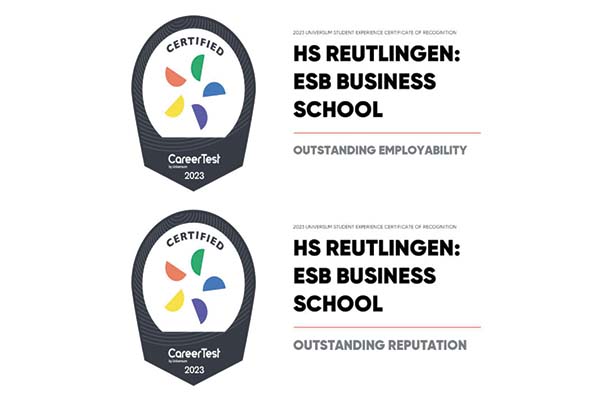Relationship networks

Why doesn’t he just come along and ask when he has a question? Why doesn’t she want to discuss the grade I gave her with me? The relationships between students and their professors contribute significantly to student satisfaction and academic success. While “good teaching” in the lecture room has already been extensively researched, there is far less information on interactions outside of the lectures. With the paper „Are students barking up the wrong tree? A causal model of factors driving effective student–faculty interactions“ Anna Goeddeke and Andreas Taschner, professors at ESB Business School, explore the topic.
“We sometimes have the feeling that students don’t come to us with subject-related issues even though that’s exactly what we are here for and would like to help. Conversely, we are repeatedly confronted with topics for which we are not responsible or with which we cannot help,” says Anna Goeddeke. Together with Andreas Taschner, she asked herself the following questions: What do students expect from their professors? Does this, in turn, match the lecturers’ expectations of the students? Are there gender-specific differences or other influencing factors?
For their paper, the two members of faculty first launched a survey among their colleagues: What is considered standard interaction with students, what is regarded as a demand that goes beyond the standard? To assess this, the respondents were provided with so-called vignettes describing different scenarios. The results were surprisingly unanimous. While some cases, for example subject-related queries outside the lecture room, are classified as standard, other interactions, for example renegotiating grades, are classified as special requests.
Afterwards, the students were asked to evaluate the same vignettes. They were asked to indicate when they would initiate the specific interaction, what their expectations would be and how disappointed they would be if the lecturer did not meet these expectations. Basically, the results show that the understanding of faculty and students is not that far apart. In standard situations, students are sometimes even more reserved than professors would expect them to be.
There were clear differences in the vignettes on situations that go beyond the standard, for example changes in grades or sample solutions to old exams. “Female students seek out such special situations less often than their male counterparts because they do not expect to be successful. If they do make such a request and it is not fulfilled, however, women are also more disappointed than men”, says Andreas Taschner about the results.
Another group that stood out in the evaluation were students who were classified as “academically entitled”. This refers to the attitude of students expecting academic success without taking personal responsibility for achieving it. They are more likely to seek interactions that go beyond the standard and have higher expectations of their lecturers, especially female professors. However, if their requests are not met, they are more disappointed in men than in women.
“As faculty, we should actively encourage students to get in touch with us outside of the lecture room, especially when it comes to subject-related issues and discussions”, sums up Anna Goeddeke. Andreas Taschner adds: “At the same time, however, we have to be careful not to give preference to those who speak up the fastest or loudest when it comes to special requests. Everyone should benefit equally from good interaction between students and faculty.”







